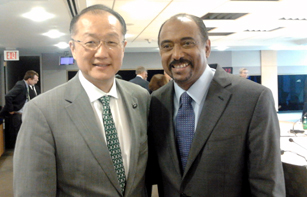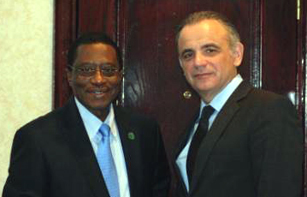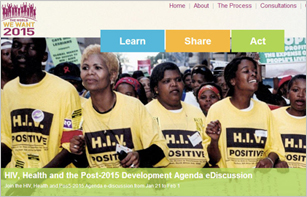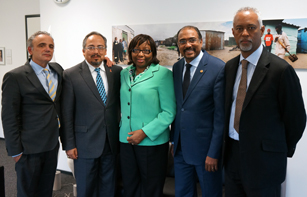
Credit: UNAIDS
Big questions were raised about getting the best results in health and development at the World Bank’s Africa Development Forum 2013. The event brought together Ministers of Finance and Health from some 30 African countries to explore effective and creative ways to ensure the future health of the continent.
With the umbrella theme finance and capacity for results, the aim of the forum was to identify concrete strategies to ensure that investments in health produce sustainable results on a large scale. Also sought, were new ways to finance and build institutional capacity so that African countries can design, implement and evaluate health investments.
“We need more money for health and more health for money in Africa,” said the host Makhtar Diop, Vice President of the World Bank Group, Africa Region in his opening remarks. “This landmark conference aims to jointly decide on concrete actions for countries and show partners how to further invest in health and sustainable growth in Africa,” he added.
Urgent change needed
Several key characteristics of the continent’s health systems need to be urgently addressed, according to the participants. For instance, the average per capita health spending in Africa was seen as low. However, it is higher than in many South Asian countries where health outcomes are considered generally better. Therefore, Africa would not only need more health financing but also, it would need to spend what it has more effectively.
We have a unique opportunity to recommit ourselves to universal access to health that is critical for short, medium and long term growth, ending poverty and building shared prosperity.
President of The World Bank Group Dr Jim Yong Kim
In addition, out-of-pocket expenses for accessing health services were also defined as extremely high, constituting about one third of all health expenditure in sub-Saharan Africa and more than 60% in several countries like Cameroon and Sierra Leone. Such personal spending may contribute to increase poverty and decrease the use of medical services.
Many African countries are still heavily dependent on external resources to finance their health sector. For some, as much as 40% comes from this stream and in 26 of 33 countries in sub-Saharan Africa, donor support accounts for more than half of HIV investments. Participants defined this dependency as a serious sustainability issue requiring more self-sufficiency and building of domestic capacity with self-financing as the ultimate goal.
Speaking about sustainable financing, the Minister of Finance of Nigeria Hon. Ngozi Okonjo-Iweala stated that, “It is not only the volume of financing that matters but how that really responds to the need of the poor,” said Minister Okonjo-Iweala. “In a country deciding on how to best respond to those needs, political will and leadership are key.
In Africa, a shift from investments that focus on inputs and processes to those that focus on results and systemic changes is already underway. Health sector reforms and efficiency improvement initiatives, results-based financing (RBF), and public-private partnerships in many countries have resulted in rapid scaling up of service coverage and improved efficiency in how resources are used for health.

President of The World Bank Group Dr Jim Yong Kim (left) and UNAIDS Executive Director Michel Sidibé.
The RBF approach at the facility level, pioneered in Rwanda, has resulted in a substantial increase in coverage of high-impact activities such as immunization, family planning, the distribution of mosquito nets, and skilled attendance at delivery. Today, more than 20 sub-Saharan African countries are piloting some form of RBF. Development partners are also trying out this mechanism at the country level. For example, the new World Bank financing instrument known as Program-For-Results (PforR) will now be used in Ethiopia to link disbursement directly with achieving national programme results. Many sub-Saharan African countries have also established social safety nets. Through these initiatives, people with limited or no resources may have improved access to basic health services, among other services, so that they do not have to skip necessary care or endure financial hardship related to it.
The AIDS response: a new paradigm
In charting the way forward Michel Sidibé highlighted the role of the AIDS response in pioneering a new paradigm of sustainable development, shared responsibility and global health solidarity. He stressed that, despite the progress made in reducing new HIV infections in Africa, more funding, both donor and domestic, and more strategic use of that funding for greatest impact were necessary.
“Our world is shifting and we have to think about long-term financing for results,” said UNAIDS Executive Director Mr Sidibé. “Our objectives are to help countries revisit their programmes and find new mechanisms for investments in health and social development. In the AIDS response, we are seeing a major shift with the domestic investments surpassing those of the donors. We also need to maximize external aid and value for money,” he added.
Participants at the forum committed to building on African countries’ successful initiatives and experiences showing promise such as national health financing strategies, efficiency improvement programmes, results-based financing and introducing safety nets for the poor.
Closing the conference, the President of The World Bank Group Dr Jim Yong Kim said, “We need to help countries to get innovative systems for health to lift the burden. We have a unique opportunity to recommit ourselves to universal access to health that is critical for short, medium and long term growth, ending poverty and building shared prosperity.”















